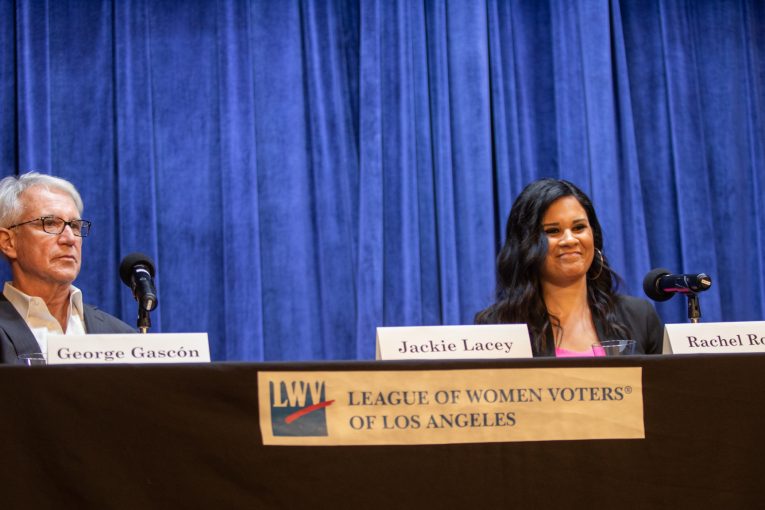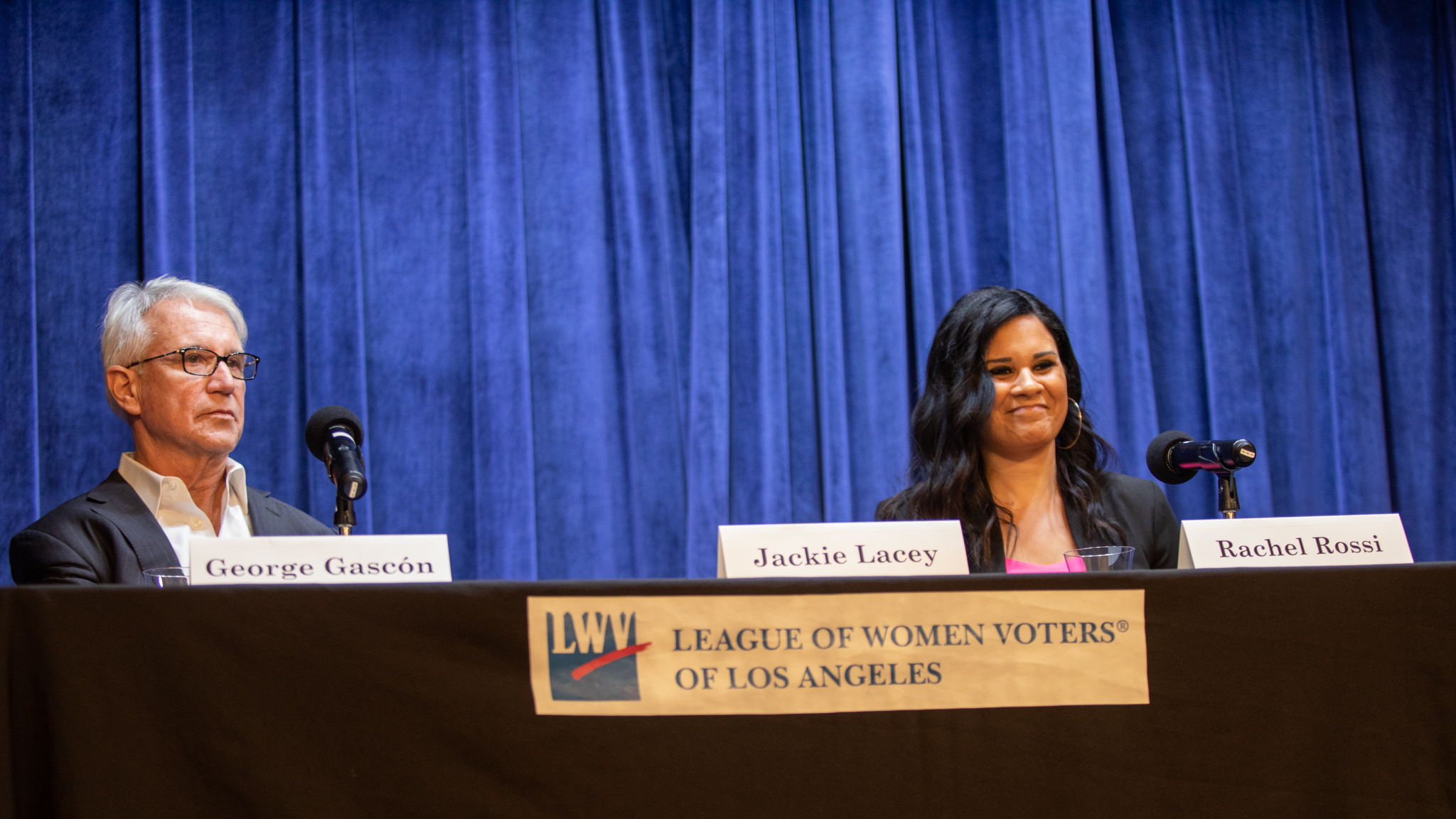
 by David Greenwald
by David Greenwald
Our coverage of progressive prosecutors took us down to LA this week to see a League of Women Voters-sponsored candidate’s forum. Seemed pretty safe that all the candidates would participate, but after traveling all day to capture one of the seminal early races this year in the country, we learned that the incumbent had pulled out.
Disappointing for sure.
What happened was that, in late January, there was a debate and it got out of control.
Describes the local news: “The debate pitted incumbent Jackie Lacey against challengers George Gascon, the former DA of San Francisco, and former federal public defender Rachel Rossi. The candidates appeared to remain calm and civil throughout most of the debate – it was the audience lashed out angrily.
“Several people in the audience were asked to leave by police after angry outbursts over Lacey’s records. One man had to be forcibly removed and nearly carried out by security  guards.
guards.
“As the moderators spoke over the uproar, chants of ‘Jackie Lacey must go’ erupted as police officers tried to remove the protestors.”
That probably wasn’t going to happen again in a League-sponsored debate. Although it was interesting to hear a man behind me in the audience calling George Gascón to task for failing to prosecute use-of-force and especially officer-shooting cases – something that Mr. Gascón acknowledged.
The race in LA is fairly interesting. Four years ago, Jackie Lacey was seen as a reformer – that has not materialized.
From the Appeal last fall: “On a host of issues—including police shootings, bail reform, marijuana legalization, and the death penalty—critics say Lacey, once seen as a reformer, has sought to preserve the status quo.”
The big announcement last week was the Los Angeles District Attorney’s announcement that she was dismissing 66,000 marijuana convictions. Never mind that counties across the state, including San Francisco and Yolo, have long since done this.
Julie Wick of the LA Times on Friday wrote that “the dismissal of convictions, which comes years after California voters legalized, means that 22,000 people no longer have felonies on their records in California, and 15,000 no longer have a criminal record at all. It’s a reversal of decades of drug enforcement that disproportionately targeted people of color, who then faced barriers in finding housing and jobs and enrolling in school.”
James Queally, who is covering the district attorney’s race for the Times, tweeted while “the move is sure to be hailed, it will likely raise some political eyebrows.”
Neither progressive challenger was impressed.
“Today our district attorney claimed to be so innovative to expunge all marijuana convictions, two years too late,” Rachel Rossi said during Thursday’s debate, noting that the DA initially opposed the legalization of marijuana.
She added, “We have a problem in our district attorney’s office where it is still seen as a criminal issue and not a public health issue.
“Across the country, people have started to see that the war on drugs was a failure,” she said. “It was a war on communities and on people. But in our county, we’re continuing that war.”
George Gascón put out a press release: “Government shouldn’t wait for the people to take action, it should take action for the people. Today, prior to state law forcing her hand, the District Attorney finally dismissed these convictions.”
He said: “For years, and in spite of legalization, individuals were denied employment and housing opportunities because of old marijuana convictions. Lack of access to a job and housing are primary factors that drive recidivism, and that’s why I took this action two years ago; it enhanced community safety and equity. That’s also why it sparked a national movement.”
He concluded: “This two-year delay is indicative of a dated approach that prioritizes punishment at all costs, even when it comes at the expense of hope, opportunity, rehabilitation, and community safety.”
“Most political observers have noted this is a mirroring of something George Gascón did in San Francisco earlier, and it also happens to come the same day Lacey is avoiding a debate with Gascón and Rachel Rossi,” James Queally explained.
On Thursday, the two challengers, both clearly coming at this from a reformist mindset, were on their games.
Rachel Rossi said that “after this huge upsurge in incarceration, we are starting to see in the United States, we’re getting it. We know that we need to create reform.”
Rachel Rossi on holding police accountable: “I think it starts with getting rid of the inherent bias that exists when district attorneys work alongside law enforcement everyday and then are called upon to make a decision to prosecute law enforcement.”
George Gascón, in the wake of the CalGang database scandal, said, “I think given the totality of the circumstances, it is time for the state to eliminate CalGang altogether.”
Both candidates called for the end of the death penalty.
George Gascón said, “I would stop practicing the death penalty.” He noted that “there are many cases still pending around the county, those cases would immediately be taken out of the death penalty prosecutions.”
Rachel Rossi agreed: “I would stop prosecuting and filing the death penalty. That would free up a lot of resources because it is incredibly costly.
“I would start to combat racial disparities,” she said. “Eighty percent of the people in our LA County jails are black and Latino. The majority of the people in our prisons are black and Latino.”
She said, “To me this is a civil rights crisis that has existed for a very long time and has become the status quo.”
Overall, both reformers came across as knowledgeable, well-spoken and well-informed.
Can one of them defeat Lacey, or will this cause them to split the reformer vote?
It was interesting listening, to note that not only the crowd but also a number of the groups who helped to put this on were of the reform mindset, even as the League remains neutral on the ultimate question of who will lead the reform.
We have seen in recent years Chicago, Baltimore, Philadelphia and San Francisco go to reform. Now the question will be can cities like New York and Los Angeles follow suit. March 3 will be the first test of that.
That’s why we were there.
—David M. Greenwald reporting
To sign up for our new newsletter – Everyday Injustice – https://tinyurl.com/yyultcf9






